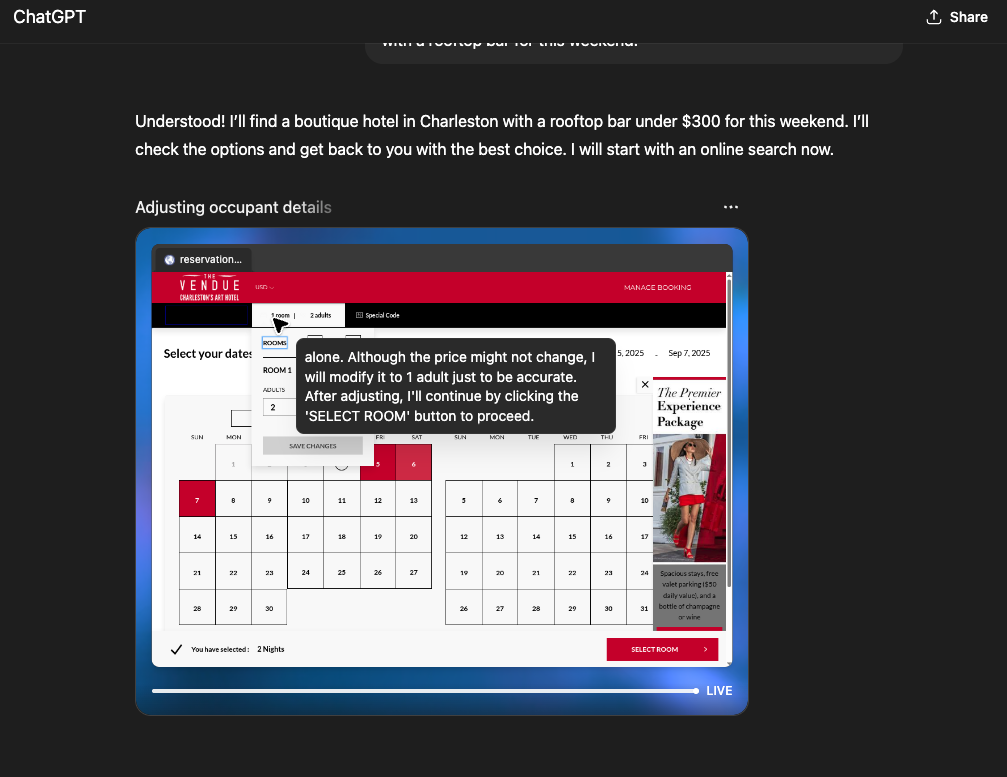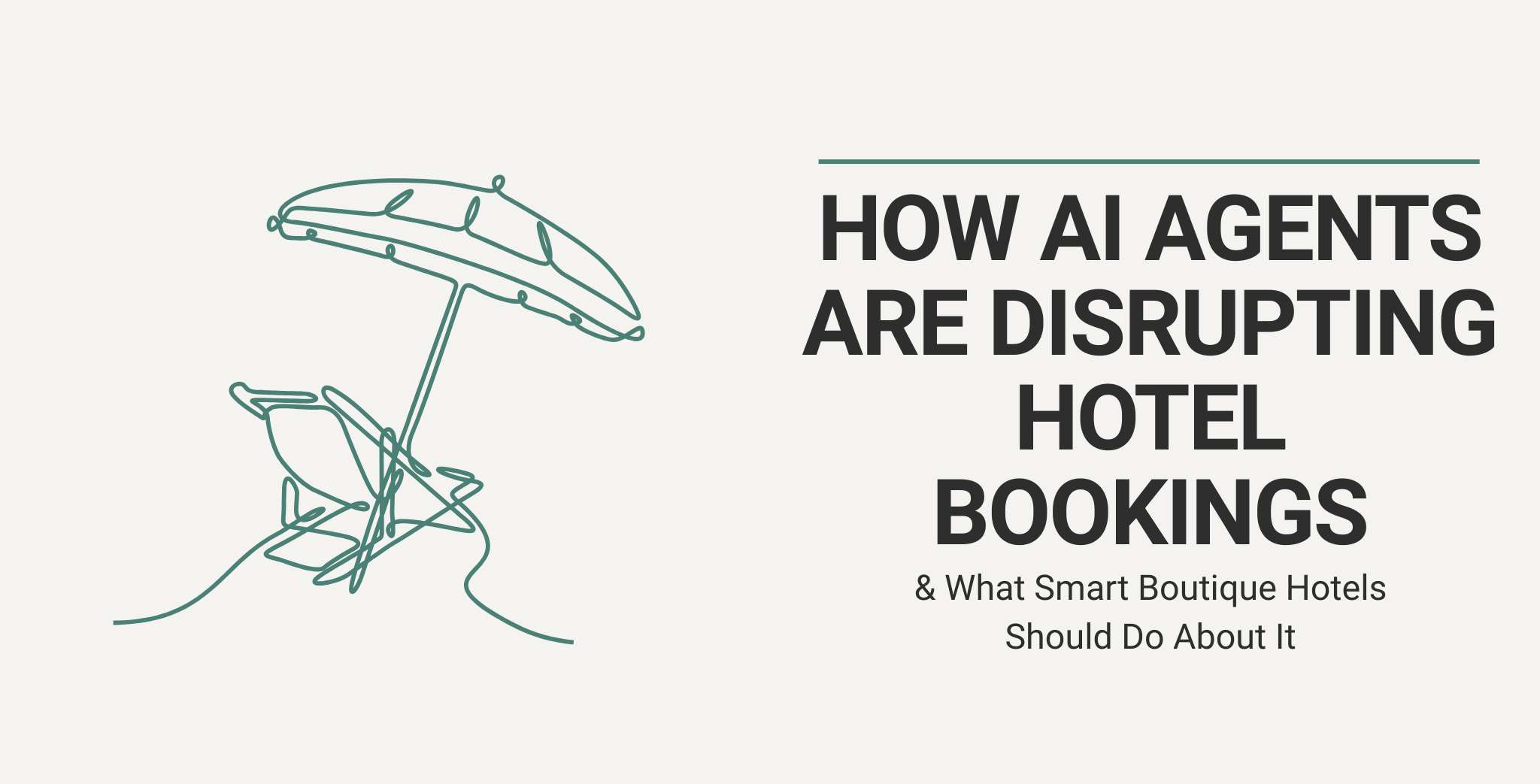TL;DR:
AI agents like ChatGPT and Gemini are evolving into full-fledged travel concierges that are capable of researching hotels, recommending properties, and even completing bookings for travelers. Boutique hotels that don’t adapt risk being left out of the conversation altogether. This post explains how these agents work, why they favor OTAs, and what hotel marketers can do to reclaim visibility and reduce third-party booking fees.
The Rise of AI Travel Agents (and Why It Matters Now)
As discussed in previous posts, the way people plan trips is changing fast. AI-powered agents like those found in ChatGPT, Google Gemini, Perplexity, and even in-app assistants from Expedia and Booking.com are no longer just tools for research. They’re becoming intelligent, proactive travel concierges that can research options, compare prices, answer questions, and book hotel stays on behalf of the user, all from a single conversation.
For boutique hotel owners and marketers, this is both a threat and a major opportunity. If your hotel isn’t structured and optimized to be visible in these AI-driven booking journeys, you’re either getting left out or driving bookings through high-cost OTA channels by default. But if you are ready? You can dramatically increase direct bookings, brand visibility, and marketing ROI.
What Are AI Agents, Exactly?
AI agents are smart assistants powered by large language models (LLMs) like ChatGPT or Claude. They’re designed to help users not just find information but complete tasks. In the context of travel, this includes:
- Recommending hotels that meet specific criteria
- Comparing amenities, locations, and reviews
- Surfacing pricing from multiple sources
- Helping users decide where to stay
- In some cases, actually completing the booking
Here’s a real example from a request I just made to an AI agent in ChatGPT:
“I typed in “Find and book me the best boutique hotel in Charleston under $300 with a rooftop bar”
Within seconds, ChatGPT went to work opening a browser window and starting to search, research, compare, and take action. At the end of the process, it asked if I wanted it to provide my credit card info and have it book or if I wanted a link directly to check out. Crazy, right?

How AI Agents Choose Which Hotels to Recommend
Here’s the kicker: AI agents are incredibly selective. They don’t show everything; instead, they surface the most relevant, data-rich options based on the user’s prompt and what’s available to the model. That means if your hotel doesn’t meet certain technical or content criteria, it may never appear in a recommendation.
AI agents tend to rely on:
- OTAs and travel APIs: Expedia, Booking.com, and Kayak feed structured data like pricing, reviews, and availability.
- Google Business Profiles and schema markup: Structured data helps agents understand what your property offers (and when).
- Your own website content: If you’re answering common traveler questions using natural, conversational language, you increase your visibility.
- Real-time data: Some agents check for dynamic availability, but most only access what’s structured and publicly available.
This favors the OTAs who already provide clean, API-fed data, but it doesn’t have to. Boutique hotels can still win by getting their data and content in order.
The Direct Booking Problem: AI Agents Default to OTAs
The convenience of AI-driven planning means the path of least resistance wins. And for most AI agents today, that means completing bookings via OTAs.
Why?
- OTAs provide structured APIs that make transactions easy for AI platforms.
- Your hotel’s own website often lacks structured pricing and availability data.
- Unless your booking engine integrates with AI-friendly tools, you won’t be the “book now” link AI agents push.
This has big implications: If a user asks ChatGPT to “book the best hotel with mountain views in Park City,” and your hotel is listed on Expedia but not well-optimized for direct booking, the AI will default to booking through the OTA. You lose the margin, customer data, and relationship. This is a huge problem.
What Smart Hotels Can Do Right Now
Here’s how boutique hotels can start preparing for the AI agent era and take back control of bookings:
1. Improve Structured Data with Schema Markup
Use schema.org markup on your site to help AI agents understand your:
- Property type and amenities
- Pricing and availability (if possible)
- Location and proximity to attractions
- Guest reviews and ratings
2. Use a Modern Booking Engine
Make sure your booking engine:
- Supports structured pricing and availability data
- Integrates with Google Hotel Ads and third-party platforms
- Is fast, mobile-optimized, and easy to use
- Has tracking in place for visibility and attribution
Platforms like Cloudbeds, SynXis, and SiteMinder are making strides here.
3. Create Conversational, Query-Focused Content
Write blog posts and FAQs that mirror how people speak to AI agents. Example titles:
- “Best Boutique Hotels in Asheville for a Romantic Weekend”
- “Pet-Friendly Hotels Near Downtown Savannah Under $250/Night”
- “Hotels With Rooftop Pools in San Diego – 5 Stunning Options”
This improves your odds of being recommended by LLMs trained on web content.
4. Keep Your Google Business Profile Fully Optimized
Many AI agents still pull from Google data. Ensure:
- Your profile has updated hours, photos, descriptions, and amenities
- Direct booking links are visible
- Reviews are fresh and frequently responded to
5. Monitor How Your Hotel Appears in AI Agents
Use tools like Perplexity, Peec.ai, or even the Pro version of ChatGPT (with browsing) to search for your hotel. Ask:
- “What are the best hotels near [your location]?”
- “Where can I stay in [city] with [amenity]?”
- “Book me a boutique hotel in [destination] for [date range].”
Take note of which properties appear and through which sources.
This Is the New Hotel SEO: AI Agent Optimization
Just as hotels learned to optimize for Google search and TripAdvisor rankings, the next frontier is LLM visibility and AI agent readiness.
That means:
- Structuring your content for AI interpretation
- Partnering with platforms that push your data to these agents
- Reducing OTA reliance by giving agents a reason to link directly
- Monitoring visibility in conversational AI tools, just as you would keyword rankings
The bottom line: AI agents aren’t a passing trend. They’re actively changing how travelers plan, compare, and book stays—and the hotels that invest in agent-ready infrastructure and content today will see a dramatic increase in direct bookings, lower acquisition costs, and better guest relationships tomorrow.
The path forward isn’t about ditching OTAs, it’s about becoming discoverable, desirable, and bookable beyond them.
Frequently Asked Questions
What are AI agents and how do they impact hotel bookings?
AI agents are intelligent digital assistants that help users complete tasks, such as finding and booking hotels, via natural conversation. They pull data from OTAs, Google, and hotel websites, and may even complete bookings directly. If your hotel isn’t structured correctly, you may be excluded from their recommendations.
Can AI agents book hotels directly for travelers?
Yes. Some AI agents, like those built by Expedia or Kayak, can book hotels on behalf of users. Others (like ChatGPT) provide direct booking links, usually through OTAs unless the hotel has structured, integrated direct booking data.
Why do AI agents favor OTAs over direct bookings?
OTAs provide structured, real-time APIs that are easy for AI models to access. Unless your hotel provides similar data (via schema markup or a connected booking engine), AI agents will default to the OTA link for bookings.
What can boutique hotels do to increase direct bookings via AI agents?
Hotels should invest in structured data (schema), integrate with AI-friendly booking engines, create conversational content, and optimize their Google Business Profiles. These steps increase visibility and improve the chance of being featured in AI responses with a direct booking link.
Is this trend only relevant for large hotel chains?
Not at all. In fact, boutique and independent hotels have the most to gain because they can reduce OTA fees and build direct guest relationships. With the right content and tech, small hotels can absolutely compete for visibility in AI agent results.
Greg is the founder and CEO of Stryde and a seasoned digital marketer who has worked with thousands of businesses, large and small, to generate more revenue via online marketing strategy and execution. Greg has written hundreds of blog posts as well as spoken at many events about online marketing strategy. You can follow Greg on Twitter and connect with him on LinkedIn.
